 GENERAL AUDIENCE TODAY
GENERAL AUDIENCE TODAY
Catechesis on
Hildegarde von Bingen
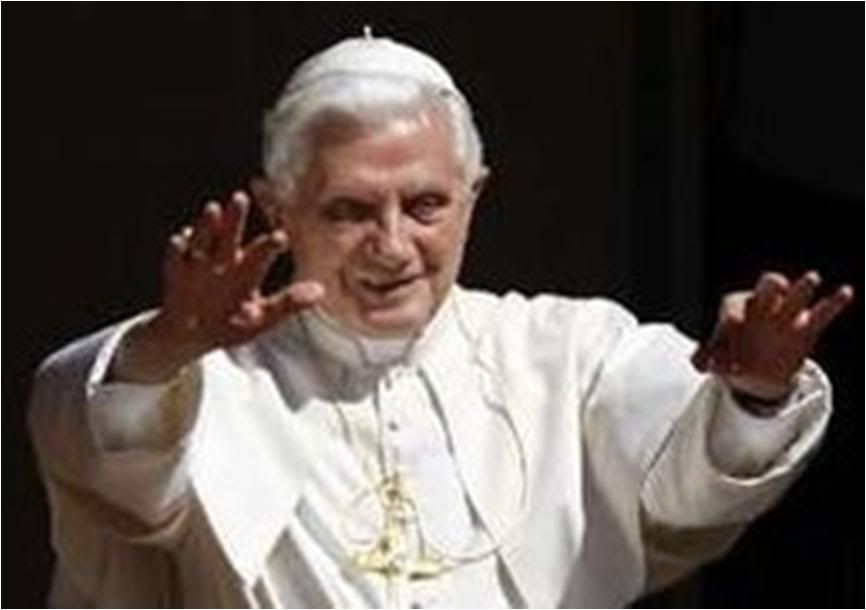
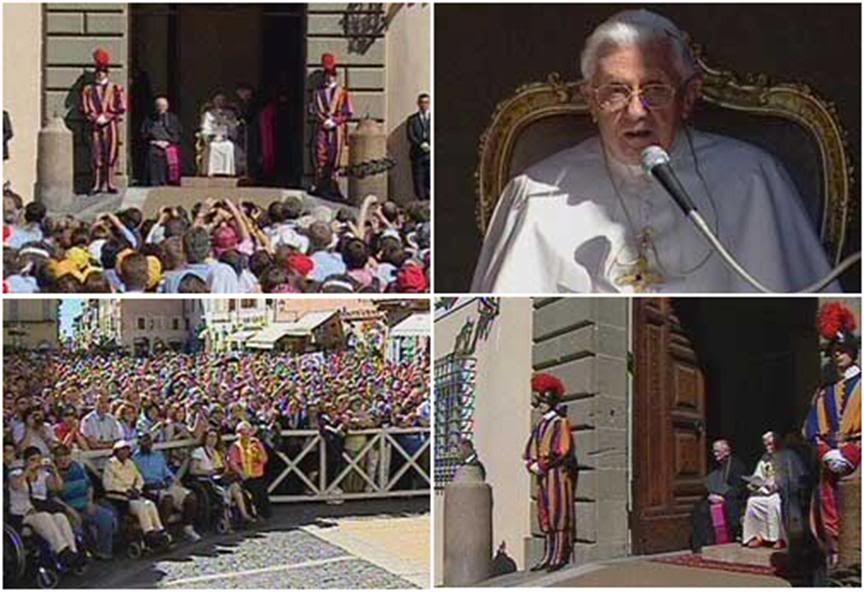 'The Holy Spirit's gifts
'The Holy Spirit's gifts
edify all believers'

Castel Gandolfo, Italy, Sept 1, 2010 (CNA/EWTN News).- Every gift from the Holy Spirit is meant for the edification of the community of believers, the Pope said at the general audienc today.
The total obedience of those who receive supernatural gifts to the authority of the Church, he explained, is part of the "seal" of authenticity that it is from God.
The Holy Father addressed an estimated 5,000 people in the main square of the town of Castel Gandolfo. It is the first time he has ever held the general audience there and he did so seated in the main entrance to the Apostolic Palace, a little above the eye-level of the crowd.
Referring first to Venerable John Paul II's Apostolic Letter on the role of women in the life of the Church entitled
Mulieris dignitatem, Benedict XVI resumed his catechetical cycle on outstanding Catholic personages and culture in teh Middle Ages.
This time, he presented the figure of St. Hildegard of Bingen as one of the saintly women who stood out nearly a millennium ago.
Born into a noble German family in the year 1098, she began her studies in human and Christian formation in a Benedictine convent in the town of Bingen, took her vows to cloistered life and, 30 years after she began her formation, became mother superior.
Carrying out this role competently, due to demand, she was able to found an additional convent nearby where she spent a great part of her life, recalled the Pope.
The way she exercised authority there continues to be "exemplary" to religious communities today, he said, explaining that she was able to create an atmosphere of "holy emulation in the practice of the good, so much so that ... the mother and daughters competed in respecting and serving each other."
Later, noting her continuing legacy, the Holy Father said, "Hildegard reminds us of the contribution which women are called to make to the life of the Church in our own time."
Benedict XVI also recalled her mystic visions which she first shared with people in confidence, including her spiritual director, a fellow sister and St. Bernard of Clairvaux.
"As always happens in the lives of the true mystics," said the Pope, "also Hildegard wished to submit herself to the authority of wise people to discern the origin of her visions."
St. Bernard, who the Pope said was held in "maximum esteem" in the Church at the time, "calmed and encouraged" the sister for the visions and eventually Pope Eugene III gave her the authorization to write and speak about the visions publicly.
"This," taught the Pope, "is the seal of an authentic experience of the Holy Spirit, source of every charism: the person (who is the) repository of supernatural gifts never boasts, does not flaunt them and, especially, shows total obedience to the ecclesiastical authorities.
"Every gift distributed by the Holy Spirit, in fact, is destined to the edification of the Church, and the Church, through its pastors, recognizes their authenticity
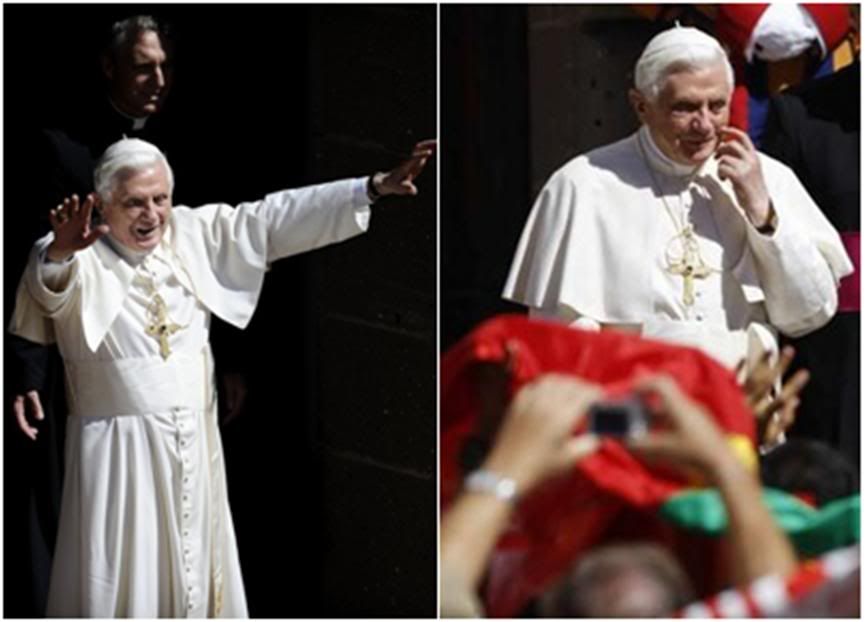
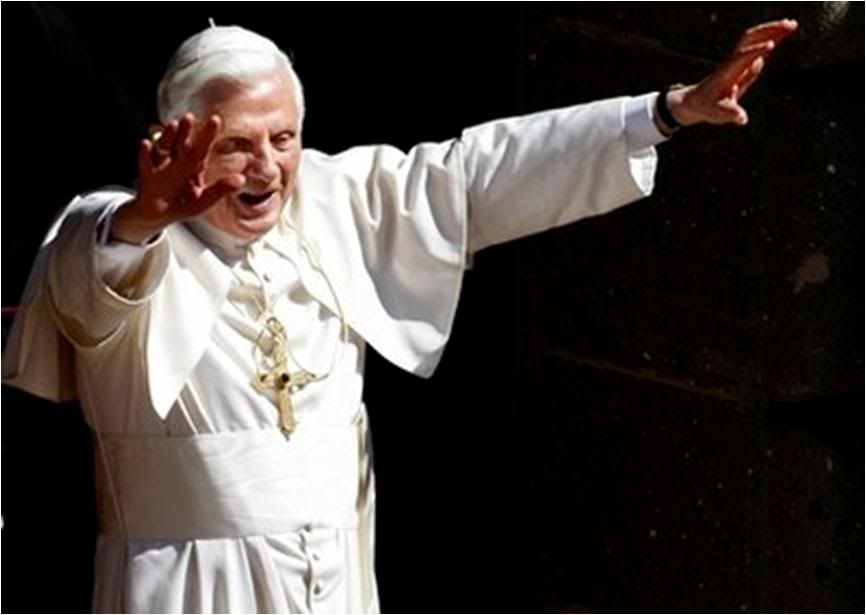
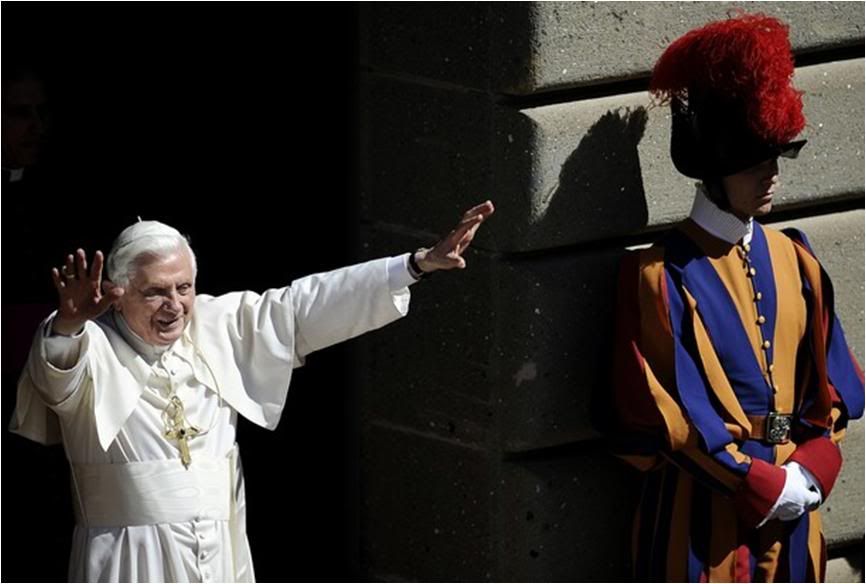
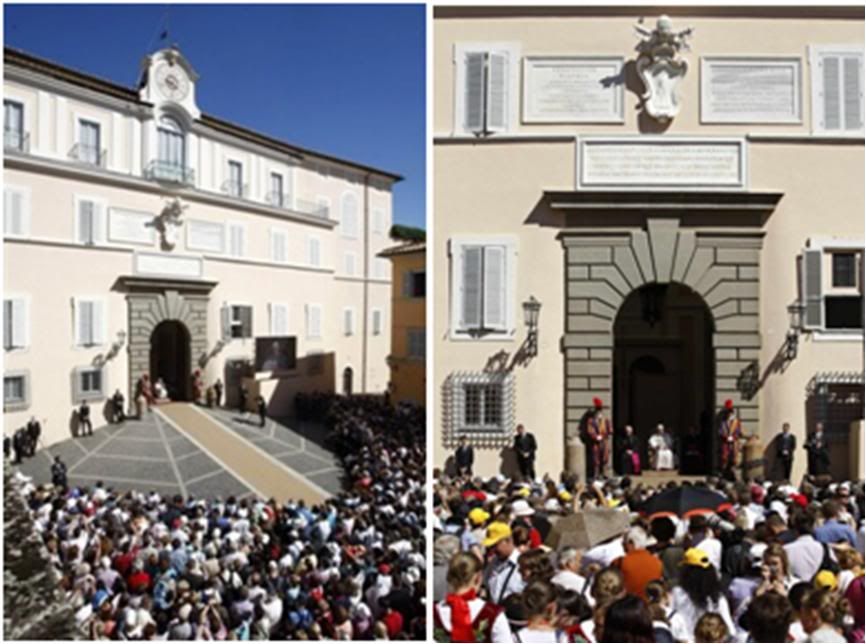
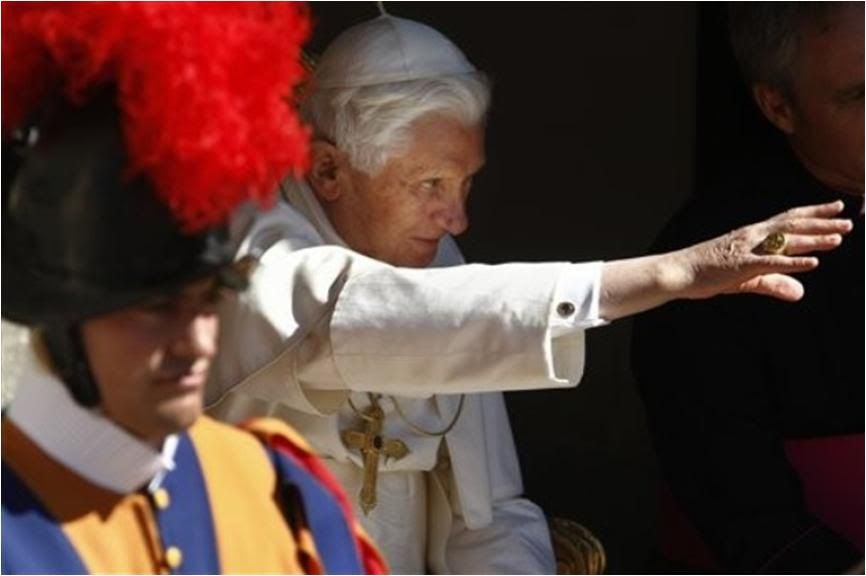 Here is a full translation of the Holy Father's catechesis
Here is a full translation of the Holy Father's catechesis:
Dear brothers and sisters<
In 1988, on the occasion of the Marian Year, the Venerable John Paul II wrote an Apostolic Letter entitled Mulieris dignitatem on the valuable role that women have plated and continue to play in the life of teh Church.
"The Church," we read, "is grateful for all the manifestations of the feminine genius in the course of history, among all peoples and all nations! She is grateful for all the charisms which the Holy Spirit has granted women in the story of teh people of God, for all the victories that she owes to their faith, hope and charity; she is grateful for all the fruits of feminine sanctity" (No. 31).
Even in those centuries of history which we habitually call the Middle Ages, various feminine figures were outstanding for the holiness of their lives, and the richness of their teaching.
Today I wish to start presenting one of them to you: St. Hildegarde of Bingen, who lived in Germany in the 12th century. He was born in 1098 in Bermersheim, in the Rhineland, and died in 1179 at the age of 81, although her health was always fragile.

Hildegarde belonged to a large family of nobles, and from her birth, she was pledged by her parents to the service of God. At age 8, in order to receive an adequate human and Christian formation, she was entrusted to the care of Judith of Spanheim, a teacher who had retired to cloistered life in the Benedictine monastery of Disibodenberg, where a small community of nuns professing the Rule of St. Benedict was taking shape.
Hildegarde took the veil from Bishop Otto of Bamberg and in 1136, when Mother Judith died, she became the superior of the community, elected by her colleagues to succeed Judith. She carried out this function applying her gifts as a woman who was cultured, spiritually elevated, and able to competently meet the organizational aspects of cloistered life.
Several years later, prompted by the growing number of young women drawn to the monastery, Hildegarde founded another community in Bingen, dedicated to St. Rupert, where she spent the rest of her life.
The style with which she exercised her authority was exemplary for every religious community. It inspired holy emulation in the exercise of goodness, such that, according to contemporary accounts, the mother superior and her nuns vied with each other in public esteem.
Already while she was Mother Superior in Disibodenberg, Hildegarde had started to dictate accounts of the mystical visions which she had been receiving for some time, to her spiritual adviser, the monk Volmar, and to her secretary, a nun whom she was very fond of, Richardis di Strade.
As it always happens in the life of true mystics, Hildegarde wished to submit herself to the authority of wise persons to discern the origin of her visions, fearing that they could be the fruit of illusions and did not come from God.
Thus she turned to the person who in her time enjoyed the highest esteem in the Church: St. Bernard of Clairvaux, about whom I have spoken in previous catecheses. He reassurd and encouraged Hildegarde.
But in 1147, she received another very important approval. Pope Eugene III, who was presiding at a Synod in Trier, read a text dictated by Hildegarde which was presented to him by Archbishok Heinrich of Mainz.
The Pope authorized the mystic to write about her visions and to talk about them in public. From that time, the spiritual prestige of Hildegarde grew even more, such that her contemporaries called her 'the Teutonic prophetess'.
It is this, dear friends, which is the seal of an authentic experience of the Holy Spirit, the source of every charism: the person who is the repository of supernatural gifts never boasts, never puts them on display, and above all, shows total obedience to ecclesial authorities.
Every gift given by the Holy Spirit, in fact, is destined for the edification of the Church, and the Church, through her pastors, recognizes their authenticity.
I will speak farther next Wednesday of this great 'prophetess', who speaks to us even today with great relevance, with her courageous ability to read the signs of the times, with her love for Creation, her healing, her poetry, her music which has been reconstructed today, her love for Christ and his Church - which was suffering even in her time, wounded by the sins of priests as well as laymen, but all the more loved as the Body of Christ.
That is how St. Hildegrade speaks to us today - and we shall say more about her next Wednesday. Thank you for your attention.
After the prayers, he said this in English:
I greet the English-speaking pilgrims, especially those from Scotland, Ireland, Denmark, Japan and Sri Lanka.
Our catechesis today deals with Saint Hildegard of Bingen, the great nun and mystic of the twelfth century. One of the outstanding women of the Middle Ages, Hildegard used her spiritual gifts for the renewal of the Church and the spread of authentic Christian living.
Hildegard reminds us of the contribution which women are called to make to the life of the Church in our own time. Trusting in her intercession, I cordially invoke upon all of you God’s abundant blessings!
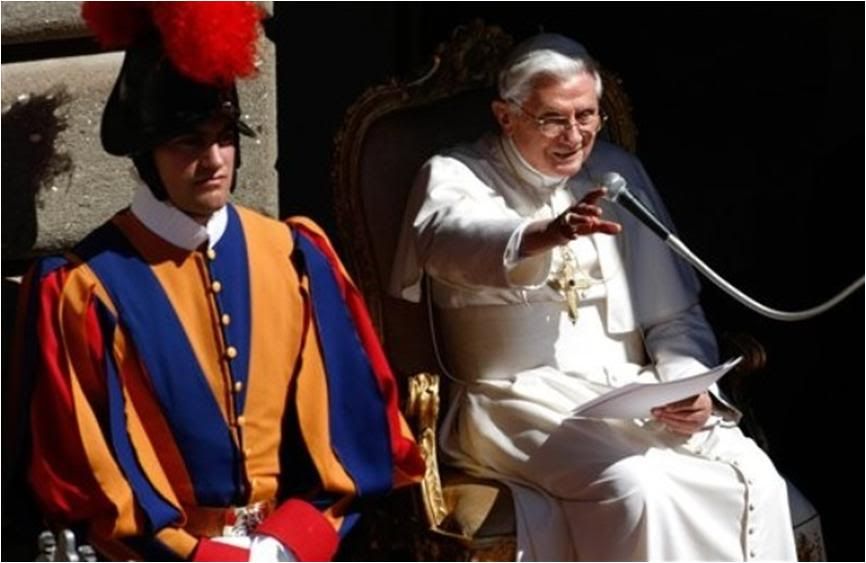
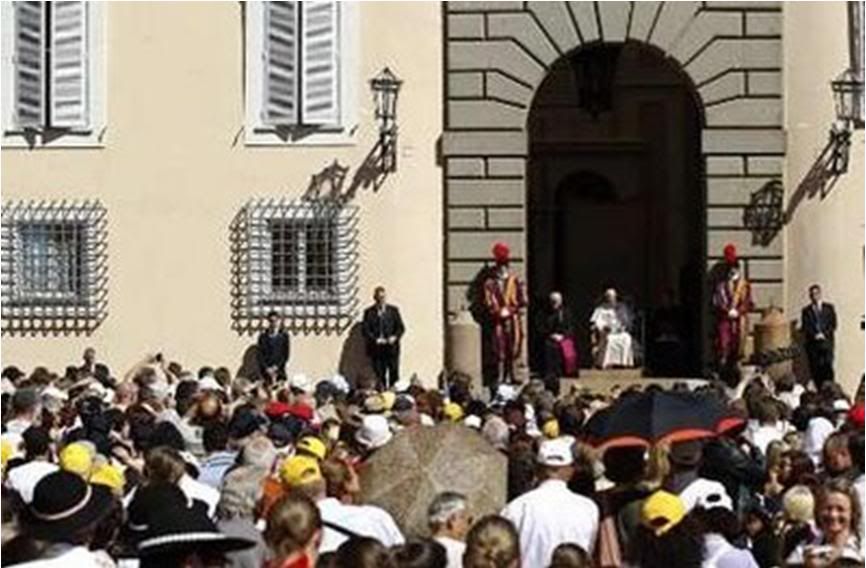




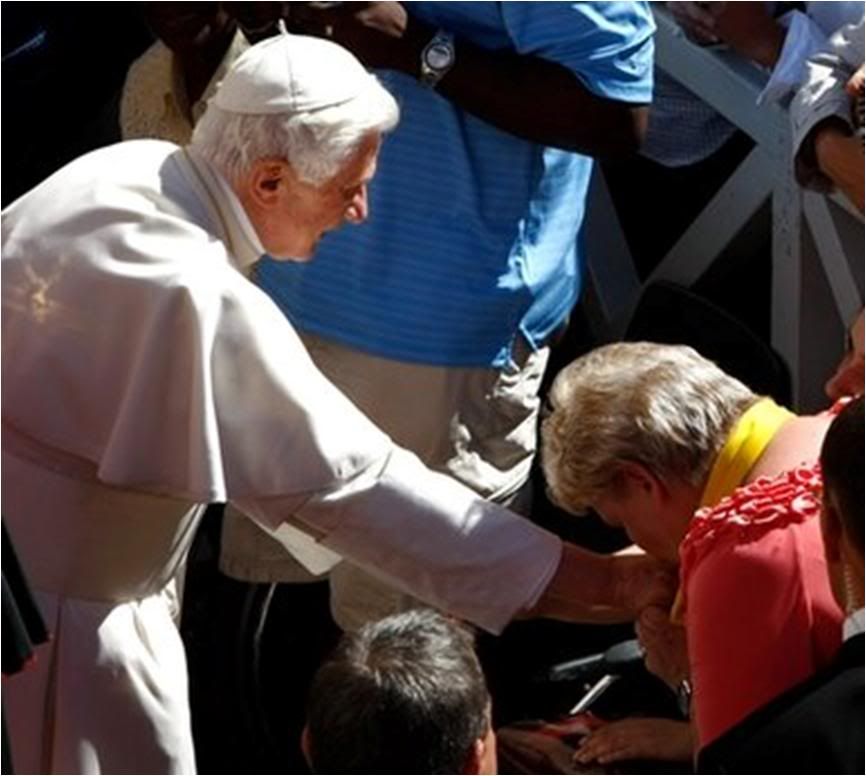
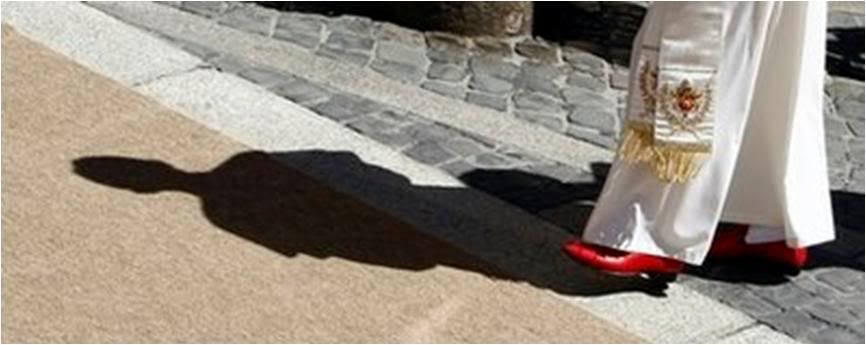 A sidebar on the GA from tomorrow's issue of the OR (9/2/10) provides the following information. I omitted the introductory paragraphs explaining why the GA was held for the first time in the main square of Castel Gandolfo, since a story about that was posted on this page on Tueday:
GA next week at Aula Paolo VI
Translated from the 9/2/10 issue of
A sidebar on the GA from tomorrow's issue of the OR (9/2/10) provides the following information. I omitted the introductory paragraphs explaining why the GA was held for the first time in the main square of Castel Gandolfo, since a story about that was posted on this page on Tueday:
GA next week at Aula Paolo VI
Translated from the 9/2/10 issue of

... The General Audience on Wednesday, Sept. 8, will be held at the Aula Paolo VI in Vatican City.
At the end of the GA Wednesday, the Pontiff greeted Ignacio Sanches Diaz, rector of the Pontifical Catholic University of Chile, who conveyed to him "the affection and the faithfulness of the entire academic community, especially its 23,000 students".
The Pope also blessed the crown for the image of the Madonna particularly venerated by immigrants in the parish of San Pietro in Carolei, in the Calabrian city of Cosenza, and for the marian image in the Polish shrine of Jordanow in the Archdiocese of Cracow.
[Modificato da TERESA BENEDETTA 02/09/2010 00:34]